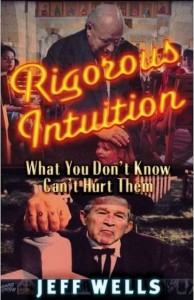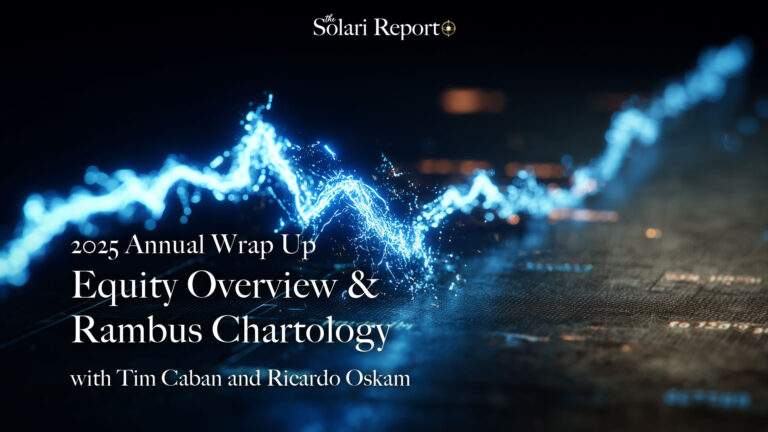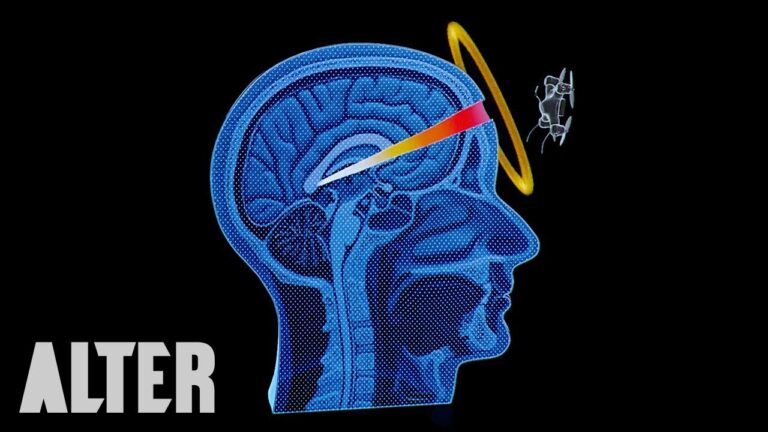
In 1997, a strategic planning group at the CIA made a visit to my company in Washington. They brought with them a woman whose job and title were classified. I was not allowed to know them. She communicated throughout the meeting that she held my work and me in utter disdain. Upon listening to my presentation on how small business and communities in America could be strengthened, she looked at me and sneered, “You know what your problem is? You don’t understand where evil comes from.”
She was right. Forced by circumstances — arranged, I suspect, by her colleagues back at Langley — I spent the years after meeting her in a concerted effort to understand where evil comes from. Yet, here I sit many years later still not having an answer to this profoundly important question. Where does evil come from?
Our economic problems are symptoms of a problem we have with evil. So if we want to address our economic problems, we have to deal with the root problem — the ascendancy of evil and its effective use of invisible weaponry, including financial weaponry
How do we navigate in a world where it is impossible to obtain the information we need to see our way clearly? If the mathematics of time and money can not help me understand phenomenon, then I try to navigate through common sense and the human heart. I view events through a spiritual prism, trying to live with uncertainty — to know what I don’t know and embrace this ambiguity with faith and grace.
This is why I have always enjoyed Jeff Wells’ blog Rigorous Intuition. Wells has a masterful way of dealing with some of the darkest and weirdest aspects of life on planet earth. Here is a man whose search for truth is without censorship. There is little urge to seek a shallow certainty. There is courage here.
Wells just published a new book, Rigorous Intuition: What You Don’t Know Can’t Hurt Them. If you want to contemplate real life outside of any bubble, this book is recommended. In a series of short essays drawing from his blog, Wells gives you many more questions than answers, some profound insights, delightful laughs and the pleasure of spending time with a fine writer.
Wells can not yet answer the question, “Where does evil come from?” Rather, he invites us to explore with him and helps us to stare into the abyss of evil and unknown with integrity and humor.






















































































































From one of the books by Jungian analyst, James Hollis, a relevant quote from Jung.
“The spirit of evil is fear, negation, the adversary who opposes life in its struggle for eternal duration and thwarts every great deed, who infuses into the body the poison of weakness and age through the treacherous bite of the serpent; he is the spirit of regression, who threatens us with bondage to the mother and with dissolution and extinction in the unconscious. For the hero, fear is a challenge and a task, because only boldness can deliver from fear. And if the risk is not taken, the meaning of life is somehow violated, and the whole future is condemned to hopeless staleness, to a drab grey lit only by will-o’-the-wisps.”
Hollis says that evil is what thwarts life, what blocks its purpose and intention. And the source of this evil is inescapable, for fear is ubiquitous. It is the bedrock of our common condition. After all, most of us have been told “the world is big and you are small. now deal with that.” While our vulnerability and our powerlessness may be mediated somewhat by supportive family and tribal mythos, or not, ultimately the world will break through our delusions and remind us of our powerlessness. Fear, then, is the enemy. Whenever fear is not made conscious, chances are very strong that the theology, the psychology, the politics will be fear-driven, fear-based, fear-compensating. From such origins much evil will arise, for as we have seen, even our most reasoned choices may serve something sinister.
It’s a slippery slope, this confrontation with the pit of evil. That’s why the shamans of old kept one foot squarely on the earth when descending into the abyss. The Masters of the Universe are currently (and openly) parading their all-knowing, omnipotent, and Malevolent Plan before us and having a feeding frenzy on the fear and sadness that it evokes in us. But we need to make a vow to ourselves to choose something else entirely, despite what we know.
There is still simple joy and praise to be had for the good medicine in wild roots, green plants and trees. Make compost and feed the precious 6 inch layer of topsoil and take the occasional break from the zapping of life force and creativity that this confrontation with psychopathy demands. Ultimately, the would-be godmen must each die mortal deaths, just like the rest of us. Hopefully, there is such a thing as the afterlife, Libra, Heaven, karma- what have you, to sort things out, but there won’t be alot of difference between the dead bones of the MOTU and our own in the end.
I think that a wonderful screenplay for a movie would be a peasants revolt, where all of these global haters would be rounded up by outraged “salt of the earth” types (aka useless eaters), who feed them a truth serum and make them speak the truth, instead of the manufactured dialectic they spew. Playground bullies cry like babies when attacked, but after years of programming and armouring, only a truth serum could unmask the pathetic, scared black hole of emptiness inside these people. Maybe we should pity those who seek to destroy us?
Man does not rule over evil except when he refuses to do it.
When he has truly done evil, he is its servant.
Hildegard of Bingen
Peaceout, and bless you Catherine,
Angela
Angela,
I really enjoyed reading your post. A good antidote for all the other stuff I’m reading right now.
Thank you.
Regards,
Evan
In light of our current situation, evil comes from greed and self-centerness. Greed is a moral vice, a failure of justice involving taking more than one’s due. Steve Forbes in the November 10, 2008, “Forbes” magazine writes: “Greed and recklesness always runs rampant during bubbles, and the mania that engulfed housing and much of the financial sector was no exception.” Greed may not be the only ingredient of evil but is certainly a part of evil. As James Madison wrote in “The Federalist Papers”, “If men were angels, no government would be necessary. If angels were to govern men, neither external nor internal controls on government would be necessary.”
I think if you define evil in a specific way you’ll be able to answer your question. It is very abstract to say evil. Ask where laziness, cowardice, greed, etc come from and you can think of specific people and experiences and start answering it. Highly abstract words lead to confusion and lend themselves to long unresolved conflicts too.
I think part of the answer is in global beliefs. If someone thinks for example, that everything is made of matter and energy and behaves according to laws of physics. That even the supposedly chaotic activity at the subatomic level is following laws that we can’t properly observe or understand and thus refute in our typical self-centric fashion (sun around the earth). Then it eventually follows to believe that everything down to the smallest thought or action is destined to happen. That from the moment the universe began or recycled through the Big Bang or however it did, everything was set-up and flowed with complete accuracy from there with no errors like an unimaginably complex clock ticking away. For them choice is an illusion. Life is a meaningless trap. Of course they cannot be responsible either, and an idea like evil becomes meaningless. Things just are.
Another example would be the evolved animal view. If I believe in evolution, and that humans are predators, then I can justify humans preying on each other. I can say, is it wrong when a spider traps and eats a fly? Is it wrong when a mouse eats the spider? A snake eats the mouse? A bird of prey eats the snake? Eyes at the front, likes to hunt. Eyes at the side, likes to hide. People are predators, the best of all on Earth. It is only natural that after dominating our environments we start competing with each other, and yes, preying on each other. It is naturally efficient. It is natural law. To this person, evil might become a largely irrelevant concept evolved to support tribal living and prevent people from destroying their immediate surroundings. Just something to guide us to more successful reproduction and survival within the tribal context in which much of our current DNA was shaped by default. (Evolution is often misunderstood as a system of active design rather than one of passive design or design by default)
I think another part of the answer is also in the formation of and relationships between global beliefs in the first place. I think most people do not carefully reflect and chose their beliefs but instead either take on those given/shown to them by others, or react to an intense experience (early-life ones especially) and form beliefs that explain that experience, or reassure them about it. When people do try to analyze and choose their beliefs they tend to feel very insecure, not knowing where to stand and fearing having no place to stand, no reference point to make the many decisions life forces upon them. So people avoid taking their beliefs apart for study. This gives incentive for the traumatizing of people so that they can be controlled, and is reinforced by telling people they are objects instead of processes so that they’ll stay trapped by failing to address their problems from a process perspective.
Most people’s beliefs are not parts of a sensible/rational whole and their conflicts cause stress, their minds tugging in different directions, decisions made difficult. And most people seek “truths” they find comfort in rather than observing and thinking with an open mind. I think this is reflected in how so many people desire a world in which THEY would thrive. So many want the world to be better for people like THEM, rather than thinking in terms of the diversity of desires, abilities and perspectives of others.
Short answer:
I think evil comes from a lack of belief in one’s ability to make meaningful choices and have real influence. This leads to a lack of hope and responsibility. That person wanders through life doing what is easy, looking for someone or something to hide behind (laziness, cowardice and greed) and constructs beliefs to justify their actions which are conflicting and thereby fatiguing. If only I had enough money, or was better looking, or met the right person, etc. They look outside themselves and get stuck in a state of what the Buddha called samsara which literally translated means “perpetual wandering”. And this in my opinion, leads to addictions. To avoid their suffering they try to distract themselves from themselves. (I don’t know about you, but everyone I know suffers from addictions of some kind) They need to address the unsupportive, draining, conflicting, and destructive beliefs first in my opinion.
If people believe all is connected yet not fated. That ‘choice’ is the real deal. Then every choice is an opportunity to create good. Every choice is important no matter how small. And hope and energy flow from this.
Daniel said:
“If people believe all is connected yet not fated. That ‘choice’ is the real deal. Then every choice is an opportunity to create good. Every choice is important no matter how small. And hope and energy flow from this.”
Amen to that!
Catherine
Edward,
And where does the word of God come from? Trust in something that has so many errors and questionable origins contributes to further blindness. Now the parables of Jesus contain many things that can be understood differently by every person. So what is truth?